‘Home Sweet Home’ will be tribute to Reema Lagoo
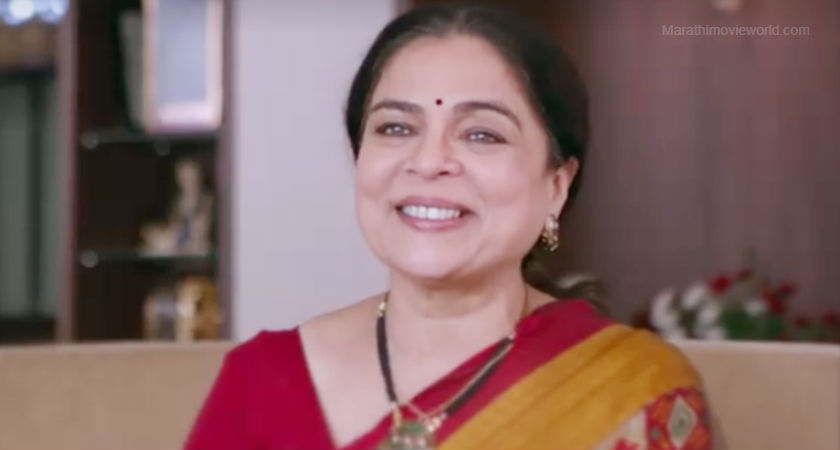
Reema Lagoo has left this world due to her untimely demise. But, through the forthcoming Marathi film ‘Home Sweet Home‘ her admirers can watch her performance, which is like a tribute to her. In this film Reema Lagoo will be seen in the role of a housewife, along with other renowned artistes like Mohan Joshi, Spruha Joshi, Hrishikesh Joshi, & Vibhavari Deshpande. This film will be Hrishikesh Joshi’s debut film as a director and revolves around redevelopment of relations. Produced by Ranjit Thakur, The film will be released all over Maharashtra on 28th September 2018.
It may be recalled that Reema was inspired to take up acting , as acting was in her blood. Her mother Mandakini Bhadbhade was a renowned actress. After completing her school education from Hujurpaga School in Pune, Reema began her acting career through Marathi stage and later went on to perform in Marathi and Hindi films simultaneously. She had performed character roles in more than 50 Hindi films, besides performing on television. Perhaps, ‘Home Sweet Home‘ will be her last Marathi film to be released.
Music of ‘Chumbak’ receives good response .
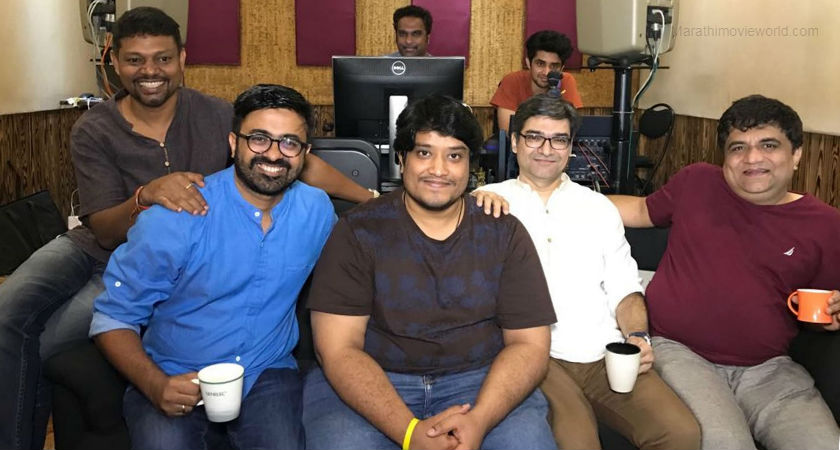
Popular Bollywood actor Akshay Kumar who is presenting forthcoming much talked about Marathi film ‘Chumbak‘ had himself released the trailer of the film generating curiosity among Marathi film lovers. Now, with the release of music of this film has also been receiving good response. Renowned Marathi actress Vibhavari Deshpande is making her debut as a lyricist through this film, having written the title song of this film, which has been composed by Amar Mangrulkar .
Amar Mangrurkar also recorded this song in the voice of Bollywood singer Divya Kumar .And, with this preparation ‘Chumbak‘ is now all set for release on 27th July 2018. Starring well known lyricist Swanand Kirkire in the lead role, the film also stars Sangram Desai from Kolhapur and Sahil jadhav from Pune in equally important roles. Produced by Naren Kumar this film is directed by sandeep Modi.
‘Tuhya Dharma Koncha?’- focuses on dilemma of Tribals
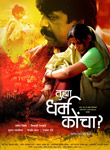 |
Rating: ★★★ ½
Producer: Abhay Gadgil, Shrirang Godbole, Mohan Damle Director: Satish Manwar Music: Dattaprasad Ranade Cinematography: Parixit Warrier Cast: Upendra Limaye, Vibhavari Deshpande, Kishore Kadam, Suhas Palshikar, Suhas Shirsat, Gauri Konge, Ramesh Medhekar, Shashank Shende Movie Review by: Ulhas Shirke |
God has no religion and therefore changing the God to offer prayers, does not change your religion. Latest released Marathi film ‘Tuhya Dharma Koncha?'(What is your religion?) tries to explain how poverty forces a poor family towards conversion to another religion and later goes on to show how the family has to face the ire from their own community. In fact, director Satish Manwar ( Gabhricha Paus fame) tries to explain the dilemma of tribals, who fall easy prey to opportunists and fanatics.
Set on the backdrop of a tiger sanctuary in Northern Maharashtra, the film revolves around a tribal family of Kavadu (Upendra Limaye) who lives in a small tribal colony with his wife Bhulabai (Vibhavari Deshpande) a small kid and a new born baby. One day, Kavadu is falsely implicated and put under trial for killing a tiger. In the absence of the bread earner in the family, Bhulabai becomes helpless when her new born baby needs immediate medical attention. She does visit the municipal dispensary at a nearby village; but can’t afford the costly food supplements prescribed. Later, when the child is seriously ill, on the suggestion of a lady from her tribe; she takes her son to a Father of a Christian missionary, who is a doctor. Indebted by the kind hearted Father and the Nun from the missionary, who offer her free treatment and food for her kid; Bhulabai regularly attends the mass at the church. She also gets converted into Christianity, only to face ire of local tribal community. Finally, Kavadu is declared innocent, as the real culprits are arrested. But, the a group of Hindu fanatics force Kavadu and few others from the village to get reconverted into Hinduism. Finally, Kavadu and his wife understand who their real God is, as they embrace a traditional tree in the last scene, to show their faith in Nature God.
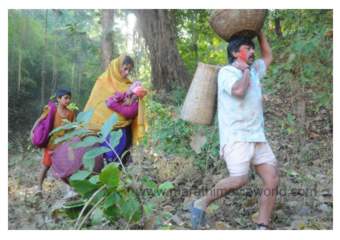
The film does deal with a sensitive issue with utmost care, without hurting the sentiments of any religion. When the Father of the church (Kishore Kadam) tells the Nun (Sneha Majgaonkar) that he was not interested in keeping the count of number of conversions; but, would be happy to find even one such true devotee of his religion; it makes his selfless service very clear. At the same time, a Hindu priest, who is spreading the importance of his religion and showing his opposition to conversions; is himself shown against violence. It is only few of his devotees, lock him up and get involved into violent activities. As a result of their aggression, the poor tribal community is in a dilemma. The director has also shown the Naxalite movement in this region; and the reason for their taking up the arms. But, in the film’s screenplay, the director has shown them neutral, in the religious uproar. There is one possibility that some of the portion must have undergone cuts at the Censor’s table.
Director Satish Manwar has however presented his subject in a realistic manner. He has used the ahirani language very well throughout the film, which is a tribute to Bahinabai Chaudhary, whose all original poems were in this language. Cinematography by Parixit Warrier is simply superb. So is the suitable music score by Dattaprasad Ranade and background score by Augustine Samuel and the wonderful flute played by Navin Iyer from South. In the role of Kavadu, Upendra Limaye has given one more fabulous performance after ‘Jogwa’. Vibhavari Deshpande has supported him well, as a helpless wife. She has expressed herself very well at every situation through her eyes. In the role of Father of the church, Kishore Kadam is at his best. The dialogues are apt to every situation. The film does throw light on the existing situation in tribal region and shows how the Government’s apathy, enables external forces to exploit their poverty.
‘Natarang’- A Classic Tale !
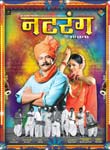 |
Rating: 4/5
Presenter: Zee Talkies Production: Zee Talkies, Athaansh Communications Director: Ravi Jadhav Story: Dr. Anand Yadav Screenplay: Ravi Jadhav Dialogues, Lyrics: Guru Thakur Music: Ajay – Atul Cast: Atul Kulkarni, Sonali Kulkarni, Kishor Kadam, Vibhavari Deshpande, Kishor Choughule… Movie Review by: Sandeep Hatangadi |
Debutant ad-filmmaker Ravi Jadhav’s ‘Natarang’ is a film that has raised the bar for quality Marathi films. The film adapted for screen from Dr. Anand Yadav’s classic novel, is a bench mark in Marathi films made on rural backdrop.
The story of ‘Nararang’ is about Guna Kagalkar (Atul Kulkarni) a village wrestler with bulging muscles who is a farm worker by profession and lives happily with his wife(Vibhavari Deshpande) and children along with his old father (Yakoob Sayeed).
It’s difficult for Guna to make two ends meet, especially because of his passion for ‘Tamasha’ a Maharashtrian dance form with ‘Lavnis’ (seductive songs).
Guna’s ultimate dream is to play a king’s role in ‘Tamasha’and so he gathers a team of unemployed friends in the village and starts his own ‘Tamasha’ troupe and a veteran ‘Tamasha’ artiste (Kishor Kadam) helps them find the ‘dancer’(Sonalee) for their troupe. But, soon Guna is in a soup to find a ‘Nachya’ or the so called clown, who brings on the laughter in the ‘Tamasha’.
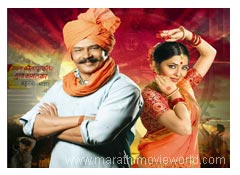
Finally, the manly muscular Guna has to play ‘Nachya’ himself, much to his chagrin; but he does so for the sake of his troupe and gets a complete makeover by becoming thin and shaving his moustache off. Guna’s troupe becomes the talk of the town but he has to lose his wife and children for his ‘Tamasha’. Interspersed in this narrative is local politics besides the competition between various ‘Tamasha’ troupes, gay artistes, etc.
But the film grabs your attention right from start to end because of Atul Kulkarni’s powerful performance, especially the scenes where he has to pose girlie in a wrestler’s body. The rest of the cast is also impressive , especially Vibhavari Deshpande, Kishor Kadam, Sandesh Jadhav, Milind Shinde, Priya Berde, etc . Sonalee looks good and dances well. Amruta Khanvilkar’s cameo is also impressive.
The music by Ajay-Atul is already a hit with the masses especially the ‘Apsara’ song and other folk numbers with good lyrics by Guru Thakur. The dialogues by Guru Thakur are well-written. The cinematography by Mahesh Limaye is slick with lots of night scenes and back lighting with soft focus lens capturing the village landscapes beautifully.
Zee Talkies deserve kudos to back a project like ‘Natarang’ and actor Atul Kulkarni who in true Robert De Niro style, had to build a strong physique by extensive workout and diet and then losing it all for the role. The film is a must-see for Atul’s performance and Ravi Jadhav’s good debut (his flashback style is very impressive).
‘Natarang’ is a film that comes once in a while. See it ASAP!
Sulochana Chavan launches ‘Natarang’ Music
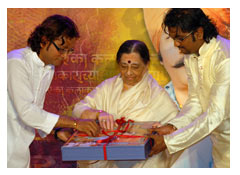 Popular Lavani singer of yesteryear- Sulochana Chavan was invited as the chief guest to release the Music CD of Zee Talkies’ film ‘Natarang‘ which is due for release shortly. While speaking on the occasion she said that it was a happy moment for her to revive the popularity of Maharashtra’s most popular folk art through the music of this film. Music directors Ajay-Atul have given a new look to the traditional Tamasha art, by almost recreating it with their modern beats of technology.
Popular Lavani singer of yesteryear- Sulochana Chavan was invited as the chief guest to release the Music CD of Zee Talkies’ film ‘Natarang‘ which is due for release shortly. While speaking on the occasion she said that it was a happy moment for her to revive the popularity of Maharashtra’s most popular folk art through the music of this film. Music directors Ajay-Atul have given a new look to the traditional Tamasha art, by almost recreating it with their modern beats of technology.
The film’s hero Atul Kulkarni was also present on the occasion along with other artistes Bela Shende, Sonali, Priya Berde, Vibhavari Deshpande, Amruta Khanvilkar. The film is directed by Ravi Jadhav .
‘I am too eager to do variety of roles in films’- Vibhavari Deshpande
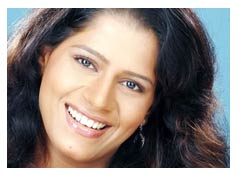
Few years ago she was seen just one of those smart young girls in in the city of Pune pursuing her job as a professional writer after completing her Mass Communication. Now, we see her playing a typical old fashioned Village woman of 60s or a traditional Maharashtrian woman of early 20th century. It does give a feeling whether another Smita Patil is born. For an artist of her caliber it is the character that’s most important. Watching her perform in ‘Harichandrachi factory’and ‘Natarang’ in prominent roles, no one could believe that she was just one of those mod college girls moving with modern outfits in Smita Talwalkar’s film ‘Saat Chya Aat Gharaat’, which was released just few years ago.
Toady, Vibhavari Deshpande has certainly made her mark into Marathi films with the help of her solid theatre background. In an interview to MMW, Vibhavari talks about herself and her experiences in this field.
Vibhavari deshpande
Q. What prompted you enter this creative field of acting ?
Since my childhood, while I was studying in Garware High School, Pune, I used to watch Marathi plays. When I joined Fergusson College for my BA course, I started performing on stage. I attended a workshop of Pt. Satyadev Dube and also attended a theatre workshop at NSD , Delhi. There was also lot to learn at Lalit kala Kendra. Later, when I joined GRIP Theatre movement, which is an Indo -German group, I developed myself to write script and also act. After completing my Mass Communication, I was working with Mr. Shrirang Godbole’s Magic Eye, as a professional writer. However, my interest in plays continued. I got my first break into films through ‘Shwaas’ with a small role. Later I played one of the seven students in Smita Talwalkar’s film ‘Saat Chya Aat Gharaat’. Also performed a cameo role in
Amol Palekar’s film and worked in Dr. Jabber Patel’s documentary. That’s how it all began few years ago. In between, I had taken a break for domestic commitments; but now, I am back with films.
Q. Whether it was playing a woman in the era of early 20th century or a typical poor village woman of 1960’s time; how did you prepare yourself mentally ?
It’s all psychological process of believing what you are at that particular moment. For people who are already into acting field, especially having done stage; it becomes much easier. If you are asking my own experience, I paid more attention on body language of these characters. While playing Ms. Phalke in Harischandrachi factory, the director Mr. Paresh Mokashi had already given us clear hints through the scripts; as to how that character is supposed to behave besides the dialogues. It clearly explained that women those days though dressed up according to the tradition, were forward in their thinking process and smart enough to take their own decisions. You must have noticed this lady, saying a flat ‘No’ to playing that much required woman character in that film, when no one was available. It was not because, she was scared, but she knew that she had some other responsibilities to shoulder at that crucial time In ‘Natarang’ I worked more on situation, and accordingly decided to emote strongly , wherever required. Watch that scene, where this lady drives away her husband who returns to take her back. In short, if the script is well written describing the character, performing that role becomes easier.
Q. While Nandu Madhav performed on stage, you appreciated his performance as a teenager. Did you ever think that one day you would play his heroine ?
Not at all. Actually, I knew him before I was signed to play. For me, Nandu was an elderly person, whom I respected a lot. When I was told about my selection to play opposite him, I was trilled.
Q. After watching you in the get up of 9 yard Sarees, Marathi film lovers are keen to watch you in a different style . Are you prepared to take on such challenges ? If so, what kind of roles, you prefer to play ?
Yes, of course! I am too eager to do a different role with a different look; hopefully soon. But, that does not mean that I am going to say. No to the kind of roles I have played before. It all depends on the importance of the character in that film.
Q. Do you think that Marathi films have really come off age ? In that case, what will be the form of Marathi films in next two-three year’s time
Yes , it is welcome change. All these film makers of recent times have really worked hard to offer good presentations. Especially, those directors with theatre background have done extremely well. As far as the new audience is concerned, especially the middle and upper middle class have started visiting the nearby theatres. Now, even the multiplex owners who were reluctant to release Marathi films, are asking for the prints. It only hurts me, when I see those pirated DVD’s of Marathi films purchased by our own people. Why can’t they help stop this piracy? Unless our own people come together and prevent this piracy, nothing is going to work. I have seen in South India, whether it is Chennai or Bangalore, it is the joint effort of common people which has prevented the piracy of their regional films. No one dares to sell the pirated DVD’s of their regional films. If we have to witness prosperity of our Marathi cinema in next 2-3 years time, this piracy is to be stopped completely with moral policing.
Q. If not shooting or performing in Dramas/ serials; how busy is Vibhavari otherwise ?
If not shooting, I get busy with my writing work. At present I am already writing dialogues for popular Marathi serial ‘Agnihotra’ as one of the three members of the script team. Even otherwise, during my free time I am associated with my GRIP Theatre movement, writing scripts for their forthcoming projects.
Q What future plans ? Will you also be doing TV serials ?
I will certainly continue with film projects, be it in the capacity of a writer or an actress. But, I have decided not to act in serials. I had few offers and I said no to them. I just don’t want to mix up that area with my film projects. As far as my association with stage is concerned, I don’t mind working on stage. Soon, I will be associated with one such project with GRIP.